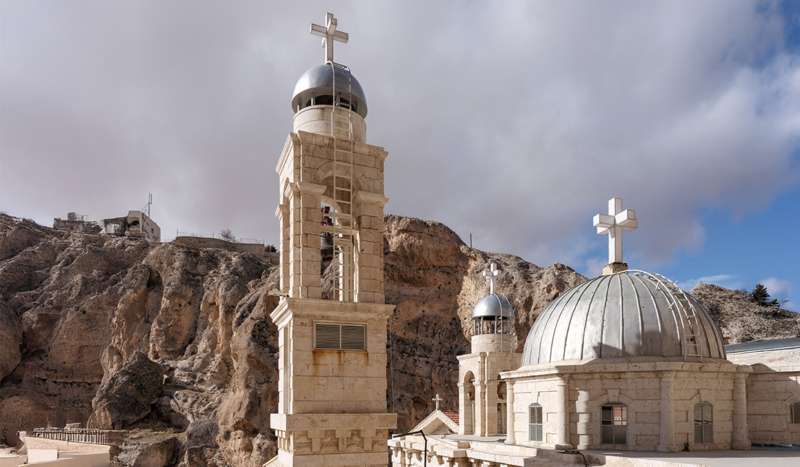
Maalul Monastery near Damascus, Syria / Adobe Stock
CV NEWS FEED // The Syrian leaders of the Melkite Greek Catholic, Greek Orthodox, and Universal Syriac Orthodox churches this week issued a joint statement calling for national reconciliation and dialogue and an inclusive drafting process of a new constitution for the country.
“This message springs from our sense of responsibility and our deep faith in the mission of our Lord Jesus Christ, Who blessed the peacemakers and called them children of God,” they stated Dec. 29, 2024.
Especially through dialogue and rebuilding, Christians have a crucial role in the transition phase into a new era for Syria, the leaders said: “We recognize that our spiritual, moral, and national responsibility compels us to always raise the voice of truth, defend human dignity under all circumstances, and strongly strive to support the path of democracy, freedom, independence, and peace, which ensures the rights and dignity of all Syrians.”
The joint statement comes less than a month after the collapse of President Bashar al-Assad’s regime, which fell on Dec. 8, 2024, following an attack by a coalition led by Hayat Tahrir al-Sham (HTS).
Designated a terrorist group by the U.S., HTS is a former affiliate of al-Qaeda led by Abu Mohammad al-Jolani.
“Despite his group’s Islamist roots,” CatholicVote previously reported, “al-Jolani has thus far refrained from targeting religious minorities and claims to pursue a nationalist agenda rather than a radical Islamist one.”
On Dec. 31, 2024, al-Jolani, who is also known as Ahmed al-Sharaa, met with Christian leaders in Damascus, during which he “offered assurances to the Christian leaders that the new Syria will be inclusive[,] wishing them a Merry Christmas and a peaceful new year,” according to Vatican News.
Just two days earlier, Melkite Greek Catholic Patriarch of Antioach Youssef I Absi, Greek Orthodox Patriarch of Antioch John X, and Supreme Head of the Universal Syriac Orthodox Church Mor Ignatius Aphrem II issued the detailed joint statement calling for national reconciliation.
To achieve such reconciliation, they called for “[l]aunching a comprehensive national dialogue that brings together all spectrums and components of society, fosters trust and social cohesion, addresses the roots of conflict, and redefines Syria’s national identity based on common values: citizenship, dignity, freedom, and coexistence.”
They also called for dialogues at local levels, community projects, and increased security and safety measures to be taken across the country to strengthen civil peace. On an international level, they pressed for an end to economic blockade and sanctions, which are harming Syria’s communities.
In their message about a new constitution, they stressed that it is crucial “for the constitution-drafting process to be inclusive and comprehensive, involving all components of Syrian society, including various ethnicities, denominations, men and women, young and old, to ensure the constitution represents the will of the people in all its diversity.”
It is also crucial, they continued, for there to be “[a]dherence of the constitution to the principles of citizenship, guaranteeing human rights, the rule of law, and the separation of powers, while respecting public and individual freedoms, including freedom of opinion and belief, as well as the inclusion of women.”
They also outlined their vision of Syria’s future, emphasizing that they hope it will be a country “where everyone, particularly women and youth, actively participates in building the future.”
They stated that they also hope for “[a] Syria where the state maintains an equal distance from all religions and denominations, with a constitution guaranteeing the state’s neutrality towards religion and religious institutions. This ensures the separation of state institutions from religious institutions and prevents the misuse of authority for religious purposes or the exploitation of religion for political gain.”
In their conclusion, they expressed hope that peace will be achieved, through God’s guidance and blessing.
“We, the heads of Christian Churches present in Syria for nearly two millennia, call upon all Syrians, at home and abroad, to work hand in hand to realize this vision and bring it to life,” they stated. “We also urge our Christian faithful not to retreat into isolation or fear but to engage actively in the public sphere, moved by the spirit of the Gospel, so they may be partners in building a new Syria.”
They encouraged Christians in the region to “lift up our hearts and hands to [God], reconcile with one another, and seek from Him strength and wisdom to move forward. Let us be peacemakers, carrying the hope of Christ and remaining faithful to His message of reconciliation, fraternal love, and peace on earth.”

